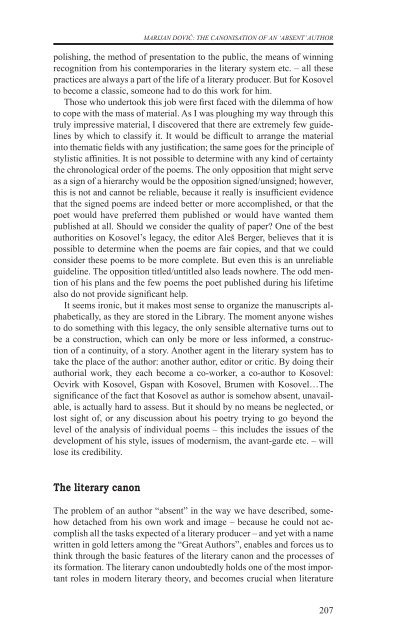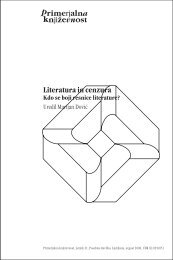razprave (pdf) - Društvo za primerjalno književnost - ZRC SAZU
razprave (pdf) - Društvo za primerjalno književnost - ZRC SAZU
razprave (pdf) - Društvo za primerjalno književnost - ZRC SAZU
- No tags were found...
You also want an ePaper? Increase the reach of your titles
YUMPU automatically turns print PDFs into web optimized ePapers that Google loves.
marijan dović: The Canonisation of an ‘Absent’ Authorpolishing, the method of presentation to the public, the means of winningrecognition from his contemporaries in the literary system etc. – all thesepractices are always a part of the life of a literary producer. But for Kosovelto become a classic, someone had to do this work for him.Those who undertook this job were first faced with the dilemma of howto cope with the mass of material. As I was ploughing my way through thistruly impressive material, I discovered that there are extremely few guidelinesby which to classify it. It would be difficult to arrange the materialinto thematic fields with any justification; the same goes for the principle ofstylistic affinities. It is not possible to determine with any kind of certaintythe chronological order of the poems. The only opposition that might serveas a sign of a hierarchy would be the opposition signed/unsigned; however,this is not and cannot be reliable, because it really is insufficient evidencethat the signed poems are indeed better or more accomplished, or that thepoet would have preferred them published or would have wanted thempublished at all. Should we consider the quality of paper? One of the bestauthorities on Kosovel’s legacy, the editor Aleš Berger, believes that it ispossible to determine when the poems are fair copies, and that we couldconsider these poems to be more complete. But even this is an unreliableguideline. The opposition titled/untitled also leads nowhere. The odd mentionof his plans and the few poems the poet published during his lifetimealso do not provide significant help.It seems ironic, but it makes most sense to organize the manuscripts alphabetically,as they are stored in the Library. The moment anyone wishesto do something with this legacy, the only sensible alternative turns out tobe a construction, which can only be more or less informed, a constructionof a continuity, of a story. Another agent in the literary system has totake the place of the author: another author, editor or critic. By doing theirauthorial work, they each become a co-worker, a co-author to Kosovel:Ocvirk with Kosovel, Gspan with Kosovel, Brumen with Kosovel…Thesignificance of the fact that Kosovel as author is somehow absent, unavailable,is actually hard to assess. But it should by no means be neglected, orlost sight of, or any discussion about his poetry trying to go beyond thelevel of the analysis of individual poems – this includes the issues of thedevelopment of his style, issues of modernism, the avant-garde etc. – willlose its credibility.The literary canonThe problem of an author “absent” in the way we have described, somehowdetached from his own work and image – because he could not accomplishall the tasks expected of a literary producer – and yet with a namewritten in gold letters among the “Great Authors”, enables and forces us tothink through the basic features of the literary canon and the processes ofits formation. The literary canon undoubtedly holds one of the most importantroles in modern literary theory, and becomes crucial when literature207
















